When the Athens department of the DAI was formally founded in 1874, the philologist-turned-diplomat Otto Lüders was the first person to be appointed as its director, at the time called the Sekretar (“Secretary”). He held this position only briefly, and until recently very little was known about his time at the DAI. Fortunately, recent work on the institute’s archive in connection with the ARCHAthen project and palaeographic study of early administrative documents have retrieved a wealth of information about Lüders’ term in office. Moreover, in 2021, a small but exciting collection of personal documents was generously donated to the DAI by the descendants of his family in Switzerland and Greece. These records allow us for the first time to glimpse several previously unknown episodes of Lüders’ life and his involvement in the internal workings of the DAI during the early days of the Athens department. This post focuses on Lüders as a scholar, from his student years to his arrival in Athens, and his crucial part in establishing the department, which has not thus far received the attention it deserves.
The Bonn years and the Franco-Prussian War
A native of Anholt in North-Rhine Westphalia, Hermann Otto Joseph Maria Lüders was born on 13 August 1844 into a family of civil servants and local politicians (his father Joseph Franz was a Prussian fiscal officer and had served as mayor of his native city from 1836 to 1846; see Anonymous 1836, 209). After graduating from the Königliches Gymnasium zu Bonn in August 1864, Lüders enrolled at the University of Bonn to study philology (fig. 1) at a time when the university was shaken by a long-standing feud between the two chairs of the subject, Friedrich Ritschl and Otto Jahn, that came to be known as the Bonner Philologenkrieg (Reitz 2020, 139).
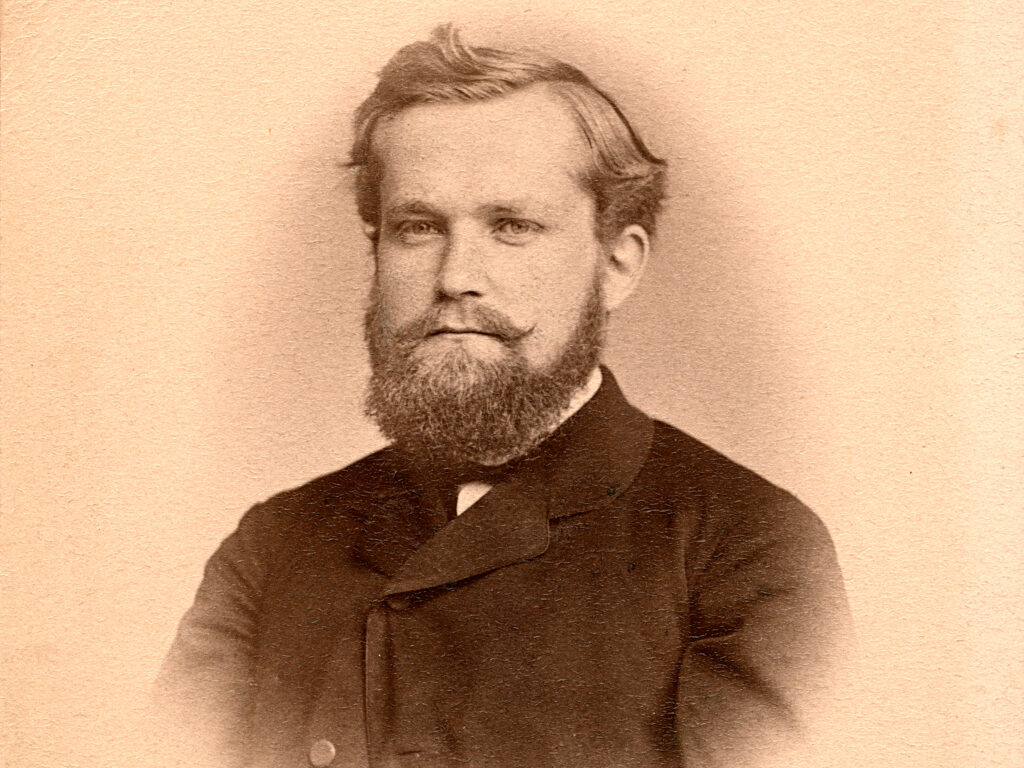
After finishing his doctoral dissertation, he concluded his studies in March 1869 and enrolled as a volunteer in the Prussian army in April. There he served for a year in the 2nd Foot Guard Regiment and was discharged with the rank of Unteroffizier in late March 1870. His plans to prepare his dissertation for publication were interrupted by the Franco-Prussian War, which broke out in July 1870. Lüders had to re-join his regiment and leave for the front. He is reported to have been a platoon leader (Wilamowitz-Moellendorf 1928, 108), and documents preserved in his personal papers indicate that he remained in France as a reserve officer until the end of the war. After Prussia’s victory, he received several medals – among others, the so-called War Commemorative Medal, which was made of bronze from the captured cannons of the enemy (fig. 2).
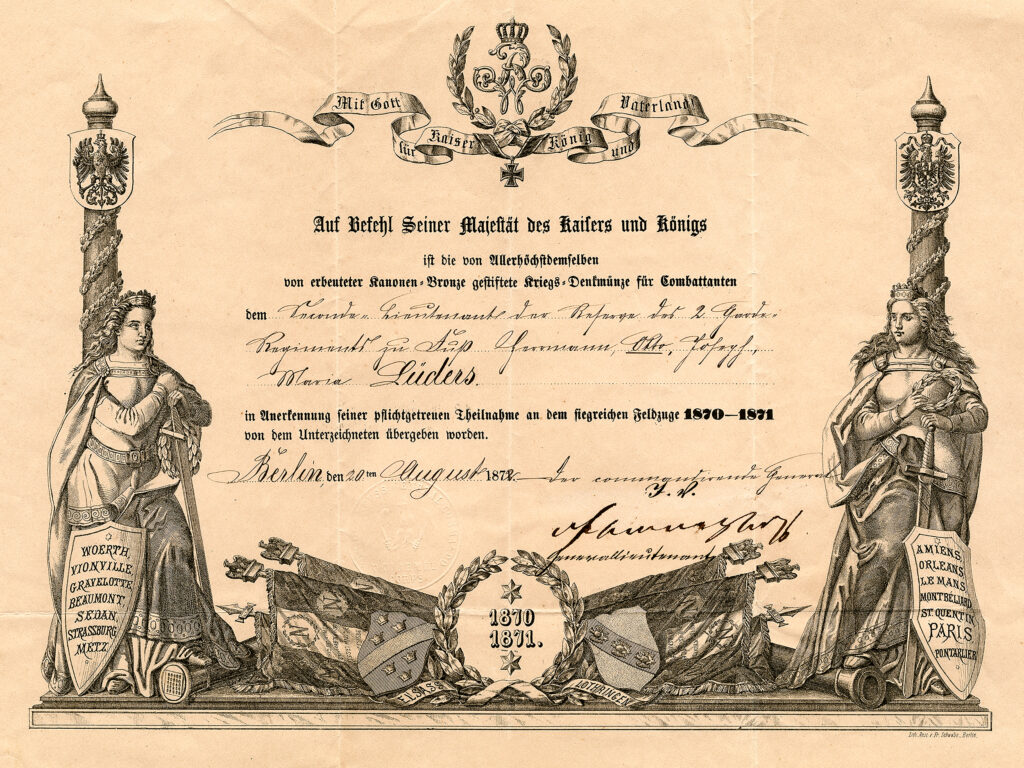
Lüders’ university years in Bonn, his military service and his participation in the Franco-Prussian War must have made a lasting impact on the young scholar. At Bonn, the powerful and influential Otto Jahn took him under his wing. Lüders became a member of the Bonn Philological Society and the famous Bonner Kreis (Calder 1987, 381; Heilen 2002, 387) and acted as personal assistant to Friedrich Gottlieb Welcker until the latter’s death in 1868. Lüders helped Welcker, whose advanced blindness made it impossible for him to read and write, complete his last major collection of studies on Greek mythology, literature and art history (Welcker 1867; Kekulé 1880, 385). Breaking with purely philological approaches to Classical antiquity, both Welcker and Jahn embraced the trend toward historicization and the school of Sachphilologie (Marchand 1996, 40–51). They were eager to combine philological texts with epigraphic sources, archaeology and the study of monuments, an approach which Lüders also adopted in his dissertation on the Dionysiac artists in ancient Greece (Lüders 1873). And last but not least, it was in Bonn where he met and became close friends with the young Ulrich von Wilamowitz-Moellendorf, later professor at Berlin. Lüders in fact dedicated his dissertation to Wilamowitz, although, on account of the war, it did not appear in print until 1873. Lüders persuaded Wilmowitz to leave Bonn and move to Berlin to finish his dissertation, and he also escorted Wilamowitz during his travels in Athens in 1873, but their relationship seems to have deteriorated later as Calder (1987) has argued. Wilamowitz went so far as to describe Lüders as a lazy person who lacked the heart for scholarship and cared only for women and money (Calder 1987, 383, n. 65).
The road to Athens via Rome (and Strasburg)
Lüders made many friends during his student years at Bonn (fig. 3); he was considered not only an attractive young man (see Calder 1987, 381) but also a promising scholar: a few months after the war, he was awarded the Institute’s travel scholarship for 1871/72 along with Gustav Hirschfeld and he spent several months in Italy (folder D-DAI-ATH-ARCHIV-NL-Lüders-LD-D-01).
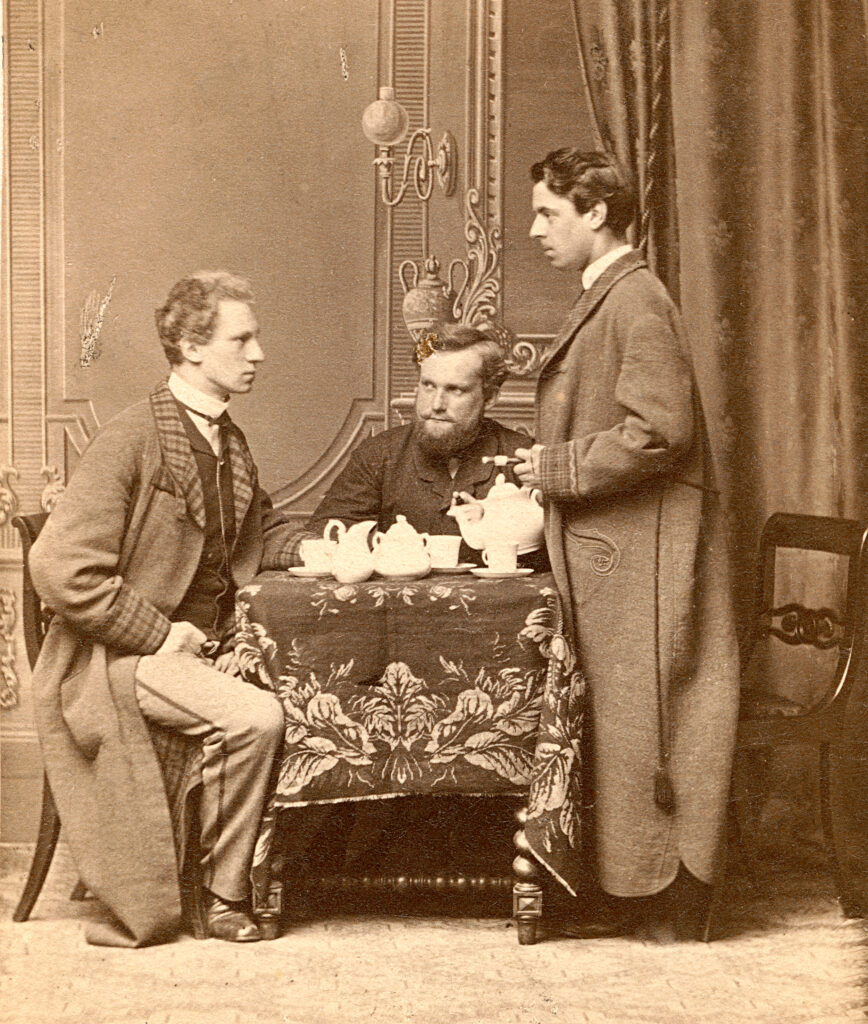
Fig. 3: Otto Lüders (middle) with fellow students during his time at Bonn. DAI Athens, Archive, Otto Lüders Personal Papers.
His sojourn at Rome in the winter of 1871/1872 gave him the chance to network with other scholars at the Instituto di Corrispondenza and made him more well-known within German academia. It also opened career opportunities that Lüders himself had perhaps not anticipated. When Ulrich Köhler, at the time secrétaire interprète at the German Legation at Athens, was appointed Chair of Ancient Studies at the University of Strasburg, his post at the embassy in the Greek capital was up for grabs. The multilingual, classically educated Lüders saw the prospects of joining the diplomatic service, something by no means unusual for middle-class Gymnasium graduates at the time, when Greek and Latin were considered as a cornerstone for a career in the higher civil service and diplomacy (Marchand 1996, 23).
Thus, although Lüders was in a sense destined to come to Athens as a student of ancient Greece, he first arrived as a diplomat. He received notice of his appointment while still in Rome, in a formal letter from the Reich’s Chancellor dated 19 February 1872 (fig. 4) (note: the year given in Jantzen 1986, 15 is mistaken).
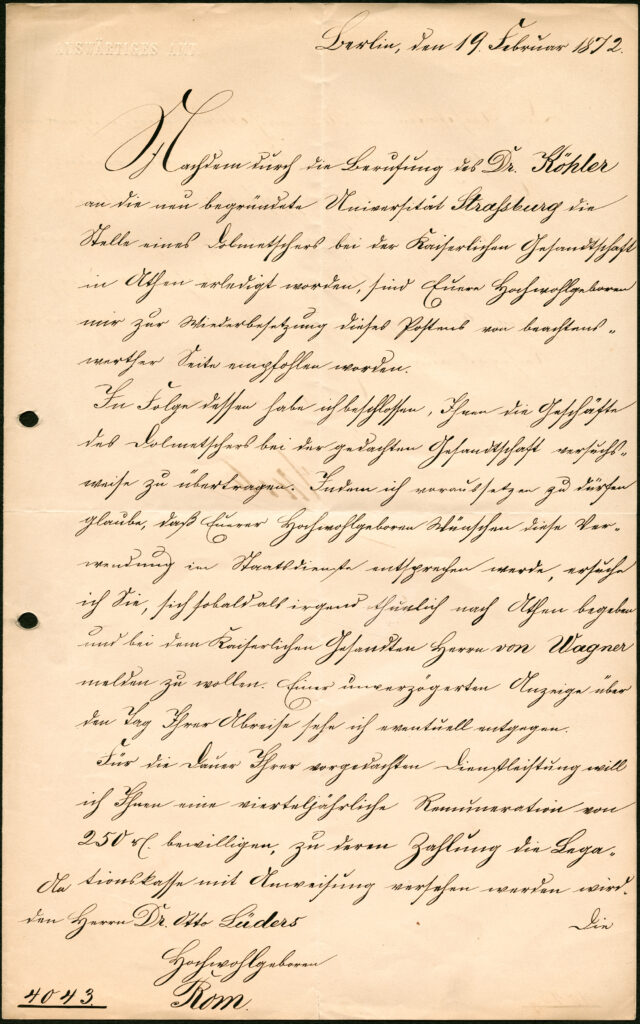
To relay the good news to Rome faster, Theodor Mommsen, who was Head of the Historical-Philosophical Class of the Berlin Academy at the time and apparently knew of the decision, wired Wilhelm Henzen, the director of the Instituto, by telegram to tell him that Lüders was to take Köhler’s place and would be dispatched immediately to Athens (fig. 5).
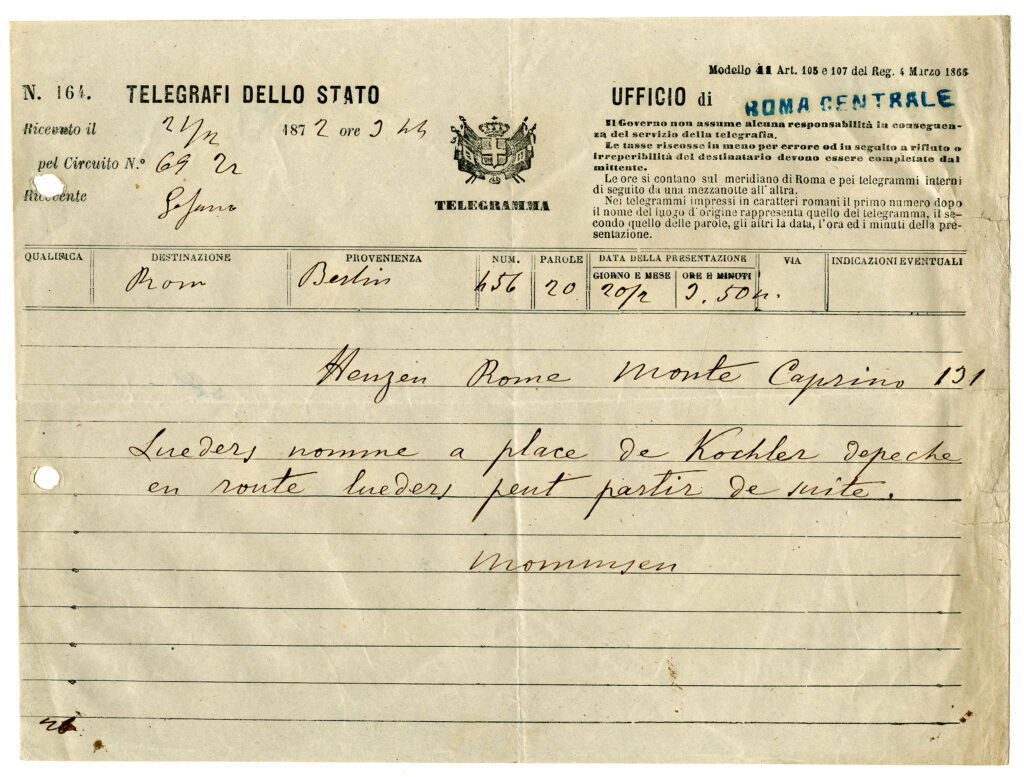
Lüders’ posting at the German Legation proved to be crucial, paving the way for his subsequent appointment as head of the new Athens department. Just a few days after taking up the post, he was named a corresponding member of the Instituto di Corrispondenza, which had already been transformed into a state-sponsored Prussian organization by 1871. In this capacity, Lüders published a number of articles and reports on new archaeological discoveries from Greece (e.g. Lüders 1874a; 1874b; 1874c). Lüders served just over two years at the German Legation; when the decision to establish the Athens department was formally ratified by the Reichstag on 17 May 1872 (Fittschen 1996, 8), he soon emerged as a candidate for the position of director.
From secrétaire interprète to Secretary
Several documents in the DAI Athens archive indicate that the Executive Committee’s first choice to head the new department was Ulrich Köhler (e.g. D-DAI-ATH-ARCHIV-RW-00176), then based at Strasburg. Nevertheless, it was the younger Lüders who was eventually appointed. The precise sequence of events that led to this decision is difficult to reconstruct but presumably had as much to do with Köhler’s reluctance to leave his university chair as it did with the fact that Lüders was already based in Greece. It thus was expected that he could deal quickly and efficiently with various practical matters related to the founding of the department. Also, as a staff member of Germany’s diplomatic mission he reported directly to the Foreign Office, which was the ministry to which the Institute had been attached after the foundation of the German Reich. Lüders was thus elected to the post of Secretary by the Berlin Academy. On 27 August 1874 he drafted a letter to the Foreign Office, stating that he was inclined to accept the position and asking to be relieved of his duties as a diplomat at the Legation so he might dedicate his full attention to it (D-DAI-ATH-ARCHIV-RW-00225). The formal notice of his appointment by order of the Kaiser arrived on 10 September 1874 (fig. 6); ten days later he received a letter from the Foreign Office, releasing him from his diplomatic duties and establishing the specifics of his salary as head of the department.
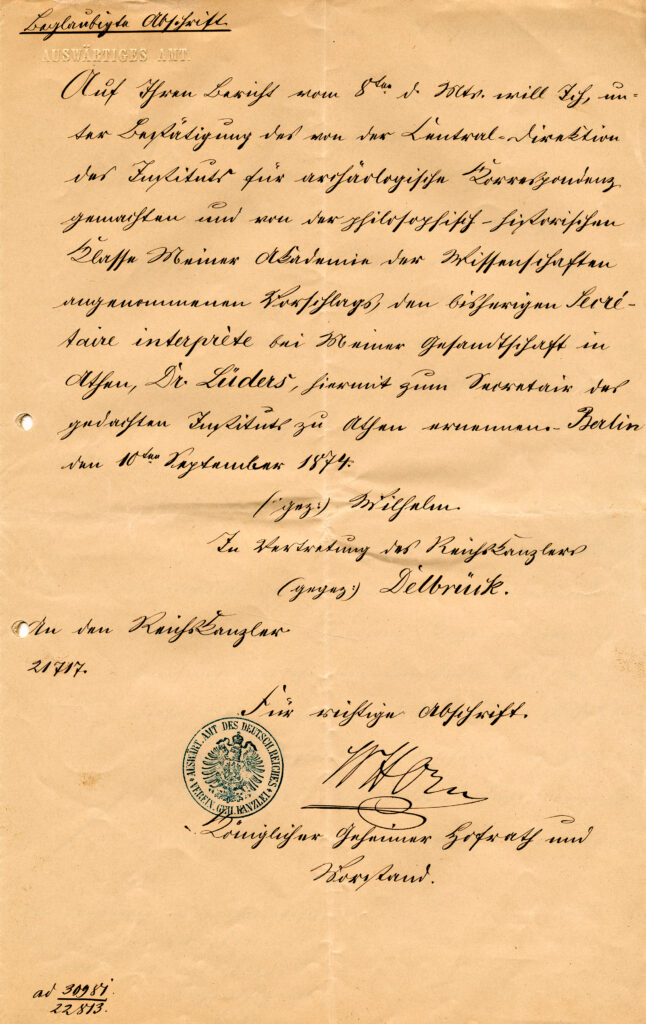
Although these documents shed light on Lüders’ appointment, it would be a mistake to think that his involvement in establishing the department did not begin until he took office. Indeed, Lüders had been made an ordinary member of the Institute on 9 December 1873 and was entrusted with logistical, financial and practical preparations for the opening long before his formal appointment, while still serving as secrétaire interprète. A letter to Richard Lepsius, General Secretary and member of the Executive Committee, dated 3 May 1874, for instance, reveals that Lüders was responsible for drafting the rental contract for the house that was to become the first home of the department at Akadimias St. 31. It belonged to the mining engineer Andreas Kordellas (D-DAI-ATH-ARCHIV-RW-00180). Two days later, Lepsius asked Lüders for a policy document on various key organizational matters, such as the new department’s housing, programme of lectures, library, publications, and fellows (D-DAI-ATH-ARCHIV-RW-00223). By 20 August Lüders was already busy planning the department’s finances for the following year, asking the Executive Committee for more funds in order to cope with the high cost of the postal service (D-DAI-ATH-ARCHIV-RW-00224). And in another letter, dated 22 August 1874, he wrote to Berlin to ask that the official seal and stamps of the Athens department be manufactured and sent to him via the German Legation (D-DAI-ATH-ARCHIV-RW-00228).
It seems that his new job and the exciting prospect of laying the foundation of German archaeological fieldwork in Greece led Lüders to believe that he would stay in the country for many years, and that it was also the right time to plan his private life. Soon after his formal appointment as Secretary, he married Aikaterini Dosiou (fig. 7a), daughter of the jurist and politician Konstantinos Dosios from Eordaia in northern Greece and the literary scholar, poet and translator Aikaterini Mavrokordatou from Constantinople. Their marriage must have taken place sometime after 2 October 1874, as suggested by a letter dated 3 November (D-DAI-ATH-ARCHIV-RW-00213), in which Lepsius congratulates Lüders on his marriage on behalf of the Executive Committee. Lüders and Aikaterini Dosiou had two daughters, Eleni and Maria, born in 1875 and 1877 respectively (fig. 7b), and stayed married until Lüders’ death in 1912. Lüders’ career, however, did not go as planned, and he had to step down from his office just over a year since his appointment.
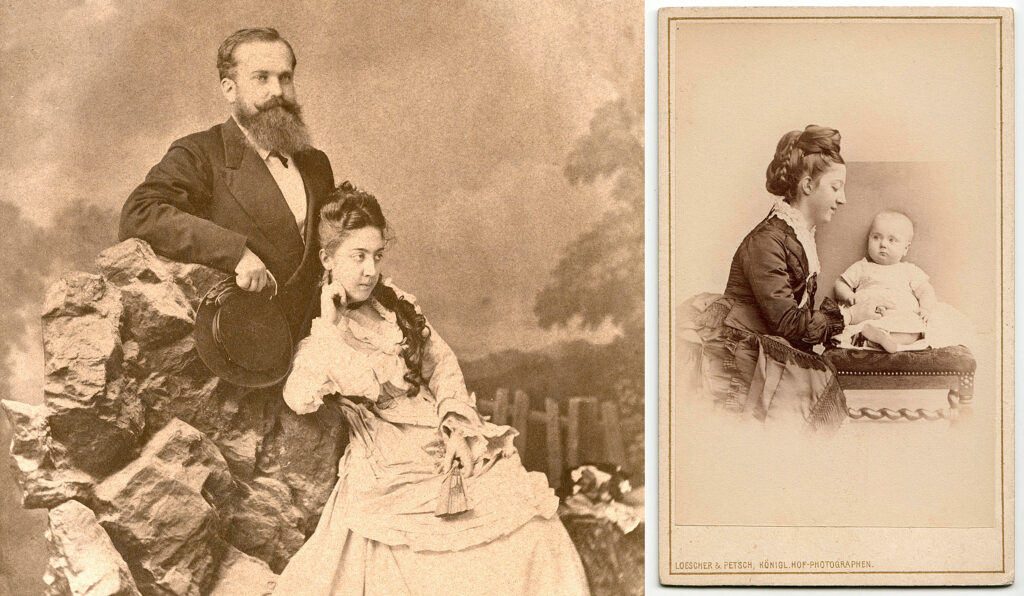
Lüders’ efforts as a director
With the official opening planned for Winckelmann’s birthday on 9 December, Lüders spent the first months trying to get the institute up and running. Although he had some logistical support from the German Legation, he was essentially on his own. Nevertheless, as a member of several learned societies, such as the Evangelical School of Smyrna, the Greek Philological Society in Constantinople, the Archaeological Society at Athens (fig. 8), and the Parnassos Literary Society, Lüders could rely on a network of colleagues for help.
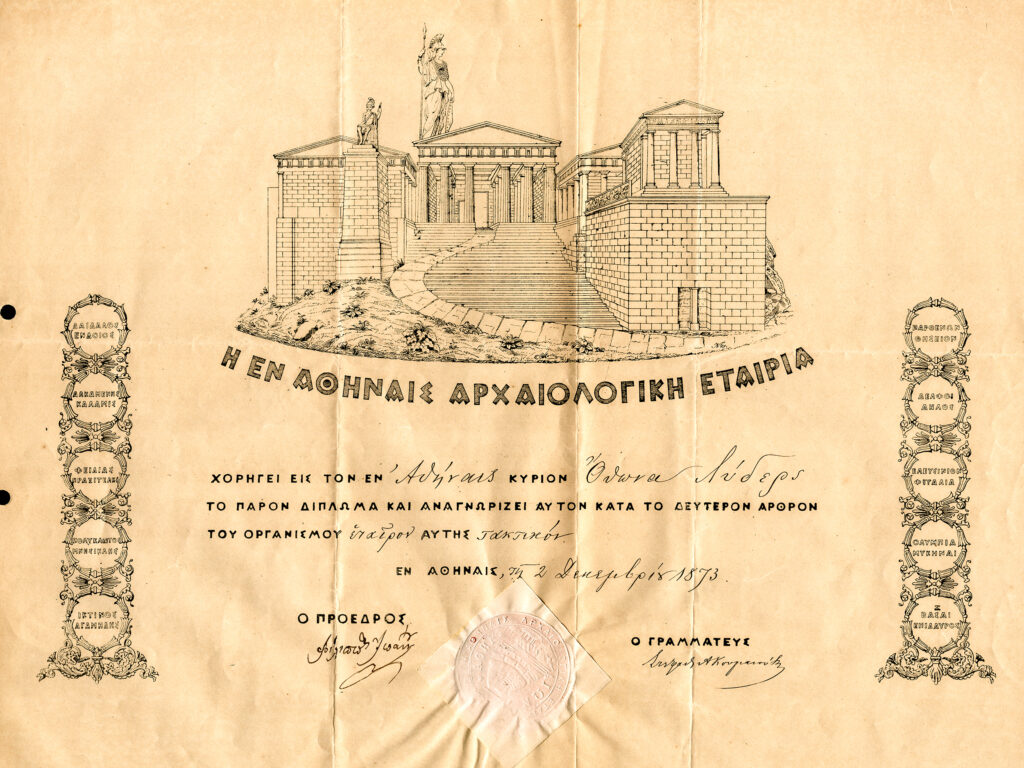
To stock the library with publications, for instance, he turned to contacts in Greece and Germany, including the Εphor of the National Library Spyridon Komnos (D-DAI-ATH- ARCHIV-RW-00216), the Director of the Jena University Library Anton Klette (D-DAI-ATH ARCHIV-RW-00217), and the Director of the Rheinisches Landesmuseum in Bonn Ernst aus’m Weerth (D-DAI-ATH ARCHIV-RW-00214), to arrange discounts on journal subscriptions and future book exchanges. At the same time, he worked closely with the Athens-based book publisher Karl Wilberg to design the department’s own bulletin with the working title Mittheilungen aus Griechenland. A draft of the first issue with complete contents, including articles and book reviews, was apparently ready by January 1875, as suggested by a letter to Lepsius (D-DAI-ATH-ARCHIV-RW-00206) in which Lüders asked for permission to proceed with printing (fig. 9). For reasons still unknown, however, permission was never granted, and the publication was put on hold. Although the Mitteilungen did not appear for another year, the first step had been taken.
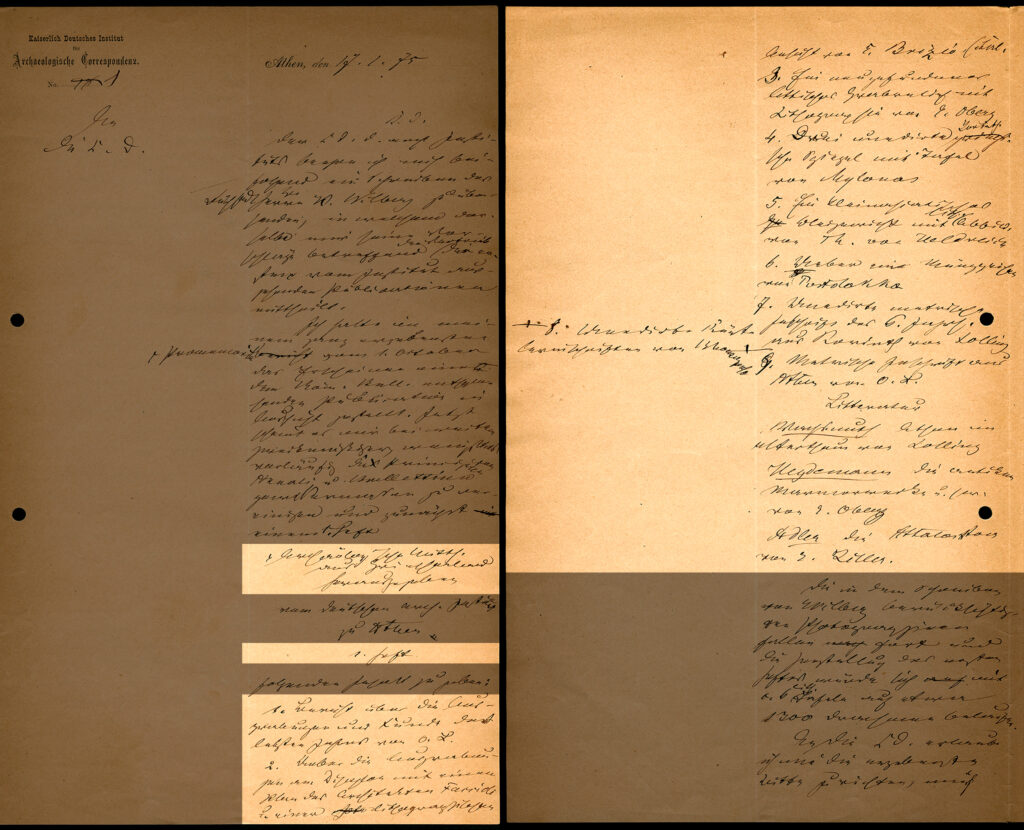
A pressing issue related to the publication of the Athens bulletin was the need to ensure that all new archaeological discoveries were adequately reported and brought to the attention of the academic community. Lüders was expected to act as a correspondent, travelling across Greece to obtain first-hand knowledge of monuments, gather information about new findings, and identify potential sites for excavation (Jantzen 1986, 15). Although little is known about this activity, it appears that Lüders was indeed busy compiling reports and making notes of discoveries to publish in the future bulletin. One piece of evidence of this effort is a report, dated 1874, which has been kindly brought to my attention by Katharina Brandt. It notes new discoveries from Athens and is signed with the initials O.L. (D-DAI-ATH-ARCHIV-NL-UNBEKANNT-0001). During a two-month leave in the summer of 1875, two DAI travel fellows, Rudolf Weil and Carl Robert, assisted Lüders in collecting relevant information (D-DAI-ATH-ARCHIV-RW-00181). When he returned to Greece, enough material had been collected that Lüders asked whether it could be scheduled for publication in the upcoming issues of one of the Institute’s journals in Berlin or Rome.
In the months following the institute’s opening, Lüders was planning to travel to Germany on a two-month leave to attend to various matters and also to report in person to the Executive Committee about the state of the new department and its problems (D-DAI-ATH-ARCHIV-RW-00199), but several commitments required his presence in Athens. Among others, he was charged with supervising the first DAI travel fellows that were to arrive in the spring and stay at the department, as well as with assisting German scholars passing through Athens. His most important responsibility, however, was to coordinate an extensive cartographic survey that laid the groundwork for the Karten von Attika (fig. 10a), a monumental collection of detailed topographic maps of Athens and its wider region (Curtius – Kaupert 1881–1894. Lohmann 2010). In a letter dated 23 February 1875, Lepsius instructed Lüders to stay in Athens to provide support for the Prussian land surveyor Johann August Kaupert and his assistant who were expected in March; they planned to stay for three and a half months to start work on triangulating the Athens basin area (D-DAI-ATH-ARCHIV-RW-00197). Later letters to Lepsius suggest that, as head of the DAI Athens, Lüders was constantly involved in various logistical aspects of the project, from managing its finances and securing supplies to inventorying the survey instruments (e.g. D-DAI-ATH-ARCHIV-RW-00182). The Karten was the first major project by the DAI in Greece; in the letter cited above, Richard Lepsius remarked that “there can be no better way to inaugurate the research activities of the Athens institute”.
Lüders’ work for the Karten was apparently mostly behind the scenes but it was not the only project that he actively supported. As early as 1873 he had been notified by the epigraphist Georg Kaibel about exciting new discoveries at the site of Tanagra in Boeotia, where numerous terracotta figurines similar to those known in the antiquities market in Athens had come to light. Lüders reported on these finds in the Bulletino and in a weekly journal for the general public, Im Neuen Reich (Lüders 1874b; 1874c), sparking the interest of German scholars (Blümner 1875). In October 1875, a few weeks before he left Athens and the DAI, Lüders informed Lepsius about a trip to Tanagra that he had taken with Reinhard Kekulé, professor of Classical Archaeology at Bonn and a member of the Executive Committee of the DAI, and the young Prussian landscape painter and lithographer Ludwig Otto (D-DAI-ATH-ARCHIV-RW-00167). Lüders wrote that, despite catching malaria and having to abstain from work for several days, they were allowed to inspect and excavate several tombs, apparently producing numerous examples of the so-called Tanagran terracotta figurines. Kekulé mentions this short campaign in Tanagra only in passing (and without reference to Lüders) in the book that he eventually published a few years later (Kekulé 1878, 10) as part of a large corpus of ancient terracottas commissioned by the Institute (fig. 10b).
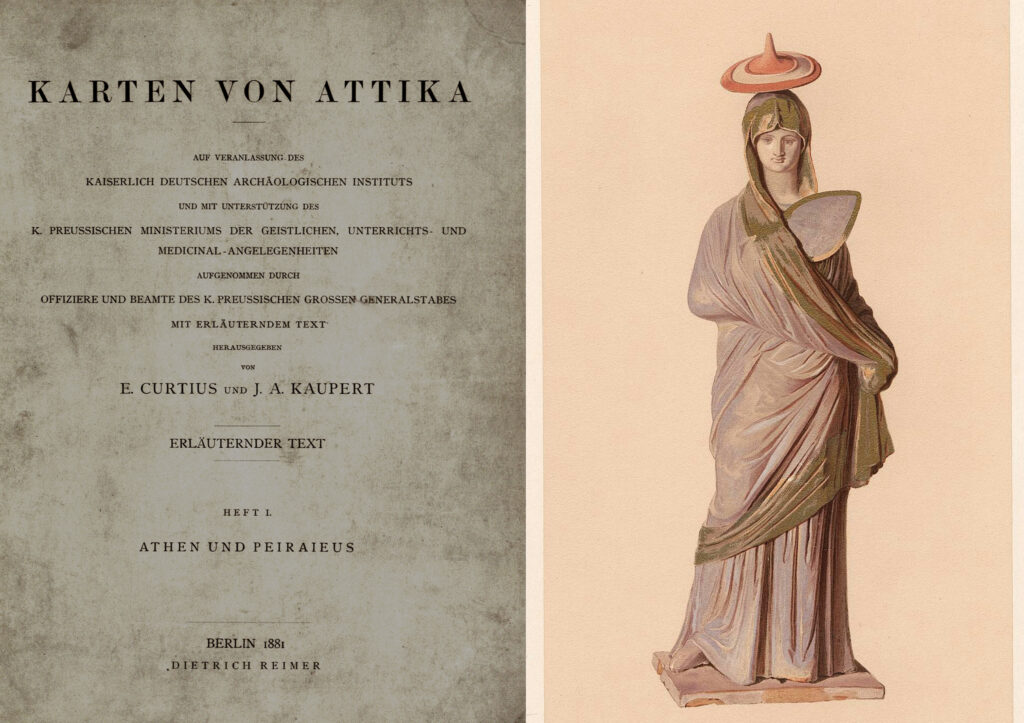
The way out
As early as 1 June 1875 Lüders had written to the Executive Committee to offer his resignation. From the tone of Lepsius’ initial reply, which survives in the DAI Athens archive (D-DAI-ATH-ARCHIV-RW-00183), it seems that it was something that the Committee was expecting. The precise reasons for Lüders’ decision are not known, but several documents suggest that from early on Lüders, perhaps more attuned to the life of a diplomat, had expressed concerns about various matters and found himself frequently at loggerheads with the Executive Committee. A serious point of friction was the funds allocated to the new department, including the salary and overhead for necessary expenses and supplies. In a letter to Lepsius dated 15 November 1874, Lüders protested that the expenses for the institute’s house and furniture were inadequate and did not cover his private residence, and he also complained about his “ridiculously small” salary, which, he argued, was not adjusted to local conditions. In his reply (D-DAI-ATH-ARCHIV-RW-00211) Lepsius reprimanded Lüders for his tone and style, pointing out that Lüders had accepted those terms when he took the post; Lepsius stated that, for the benefit of both parties, the Executive Committee had chosen to treat the letter as if it had never been written. This friction was perhaps one reason why, in a letter to Theodor Wiegand, Wilamowitz writes that Lüders called the Executive Committee and the Academy at Berlin the “two Sphinxes of Classical Walpurgis Night, sitting by the Pyramids, passing judgment on the nations […]” (a reference to Goethe’s Faust II. 7245–7248; see Calder 1987, 382, n. 60). Eventually, Lüders was asked to remain in office until the new director Ulrich Köhler could take the post. He finally left Athens for Berlin on 7 November 1875. A few years later, after serving as a diplomat in Odessa (fig. 11), he returned to Athens and opened a new chapter in his life and career. He became the tutor of the children of King of Greece George I and Lord Chamberlain, as well as Consul General of Germany.
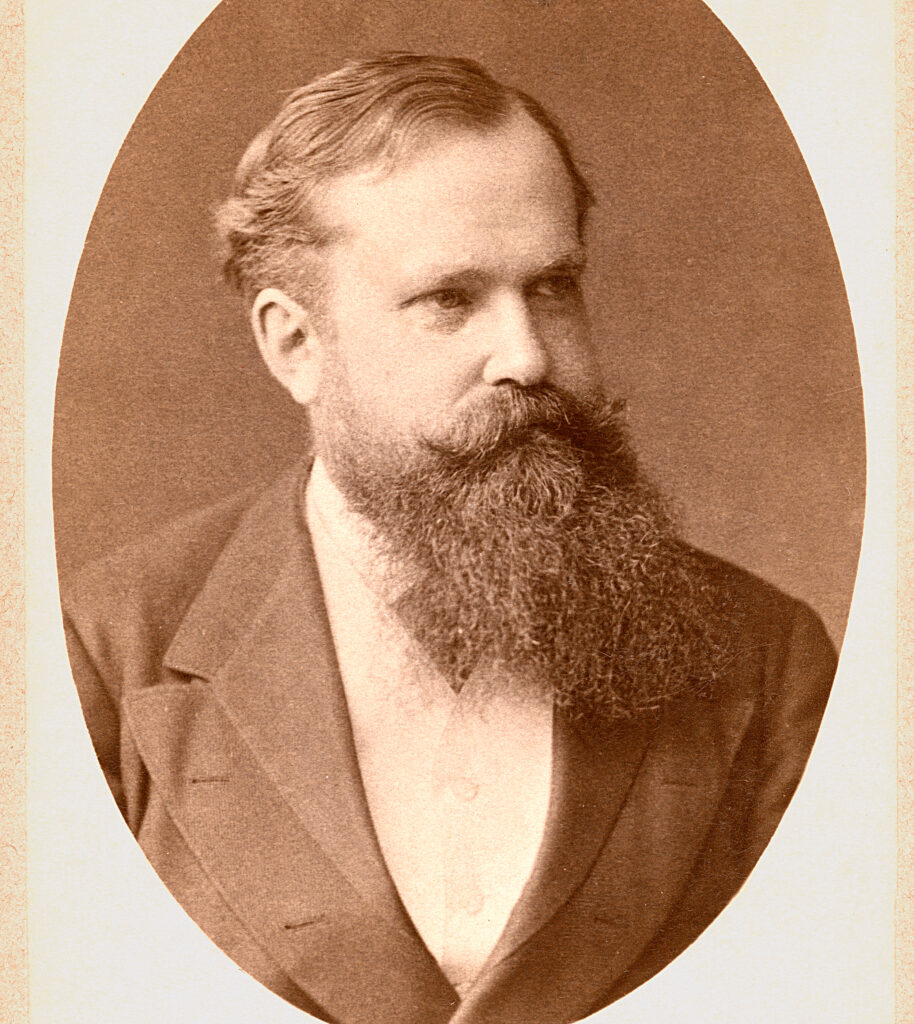
Conclusion
In his history of the DAI Athens, Ulf Jantzen (1986, 15) dedicates a mere ten lines to Otto Lüders’ term in office, bemoaning his lack of imagination and initiative, and stating that “there is really not much to report about”. Although he acknowledges that Lüders was alone and had to establish an entire institute from scratch, Jantzen’s assessment, based on very limited source material, casts Lüders’ person and his time at the DAI in an extremely unflattering light. Georg Karos’ (1912) short obituary for Lüders, in contrast, shows that his successors had not forgotten his memory and contribution to the department. Lüders played a significant part in establishing the department’s first home and its research infrastructure, and he laid the foundation for its early fieldwork and academic activities, starting even before he officially became director. Both the drafts of his letters and his official correspondence with Lepsius, however, suggest that, despite his efforts, Lüders struggled to carry out his agenda, and his relationship with the Executive Committee in Berlin was tense. For Lüders, of course, his time at the DAI was a very brief episode in a lifetime of prestigious offices in the German diplomatic service and at the Greek royal court. But his contribution to the establishment of the Institute’s department at Athens should not be underestimated. As the study of archival materials progresses, even more previously unknown details of his activity as director may emerge.
Acknowledgements
My thanks go to Katharina Brandt for offering her deep knowledge and crucial support on many matters during research for this paper. Any remaining errors are my own. I am also grateful to archivist Veronika Führer, MA, who made a transcription and palaeographic study of Lüders’ and Lepsius’ letters cited in this essay. Otto Lüders’ private papers were donated to the DAI Athens in 2021 by Mrs. Daphne Maria Voelin-Liambeys with the help of her Athens-based nephew Leonidas Liambeys. The scans were produced by Julia Engelhardt.
Works cited
Anonymous 1836
Cameralistische Zeitung für die Königlich Preußischen Staaten 14, 1836, 209–224
Blümner 1891
Η. Βlümner, Terracotten aus Tanagra, AZ 32, 1875, 140–143
Calder 1987
W. M. Calder III, Why did Wilamowitz leave Bonn? The New Evidence, RhM 130, 1987, 366–384
Curtius – Kaupert 1881–1894
E. Curtius – J. A. Kaupert, Karten von Attika (Berlin 1881–1894)
Fittschen 1996
K. Fittschen, Die Gründung des Deutschen Archäologischen Instituts in Athen. Ernst Curtius (1814–1896) zum Geburtstag, AM 111, 1–44
Heilen 2002
S. Heilen, Der Mann, der Wilamowitz zum Duell zwingen wollte: Neue Quellen zu einer bisher unklaren Stelle der Erinnerungen, RhM 145, 2002, 374–426
Jantzen 1986
U. Jantzen, Einhundert Jahre Athener Institut, 1874–1974 (Mainz 1986)
Karo 1912
G. Karo, Otto Lüders, AM 37, 1912, 11–12
Kekulé 1878
R. Kekulé, Griechische Thonfiguren aus Tanagra (Stuttgart 1878)
Kekulé 1880
R. Kekulé, Das Leben Friedrich Gottlieb Welckers nach seinen eignen Aufzeichnungen und Briefen (Leipzig 1880)
Lohmann 2010
H. Lohmann, Die „preussischen“ Karten von Attika, in: H. Lohmann – T. Mattern (eds.), Attika – Archäologie einer „zentralen“ Kulturlandschaft. Akten der internationalen Tagung vom 18.–20. Mai 2007 in Marburg. Philippika –Marburger altertumskundliche Abhandlungen 37 (Wiesbaden 2010) 263–279
Lüders 1873
O. Lüders, Die dionysischen Künstler (Berlin 1873)
Lüders 1874a
O. Lüders, Funde auf dem Boden von Dekelea, AZ 31, 1874, 55–57
Lüders 1874b
O. Lüders, Ritrovamenti di terre cotte in Tanagra. Lettera al sig. prof. G. Henzen. BdI 1874, 120–127
Lüders 1874c
O. Lüders, Ein Stück griechischen Kunstlebens, Im Neuen Reich 4/1, 1874, 176–182
Marchand 1996
S.L. Marchand, Down from Olympus: Archaeology and Philhellenism in Germany, 1750 – 1970 (Princeton, New Jersey 1996)
Reitz 2020
C. Reitz, German Altertumswissenschaften, ›Professorenhaarspalterei‹ and Organising the Classics in the 19th Century, in: E. Podoksik (ed.) Doing Humanities in Nineteenth-Century Germany (Leiden 2020) 134–154
Welcker 1867
F. Welcker, Kleine Schriften zur griechischen Mythologie, Kunst- und Literaturgeschichte. Herausgegeben von O. Lüders (Elberfeld 1867)
Wilamowitz-Moellendorf 1928
U. von Wilamowitz-Möllendorf, Erinnerungen 1848–1914 (Leipzig 1928).
Weblinks
https://el.wikipedia.org/wiki/Κωνσταντίνος_Δόσιος (accessed 29/01/2023)
http://pandektis.ekt.gr/pandektis/handle/10442/59787 (accessed 29/01/2023)
